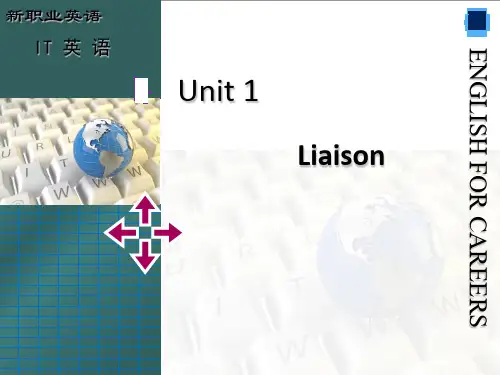新职业英语1-基础篇-Unit2精品PPT课件
- 格式:pptx
- 大小:3.46 MB
- 文档页数:77

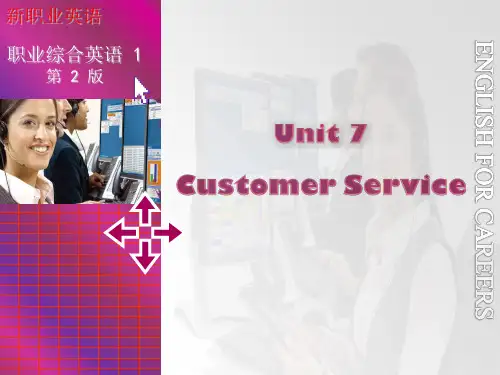
![新职业英语1酒店英语--Unit 2[优质ppt]](https://uimg.taocdn.com/ae91234410a6f524ccbf85dd.webp)
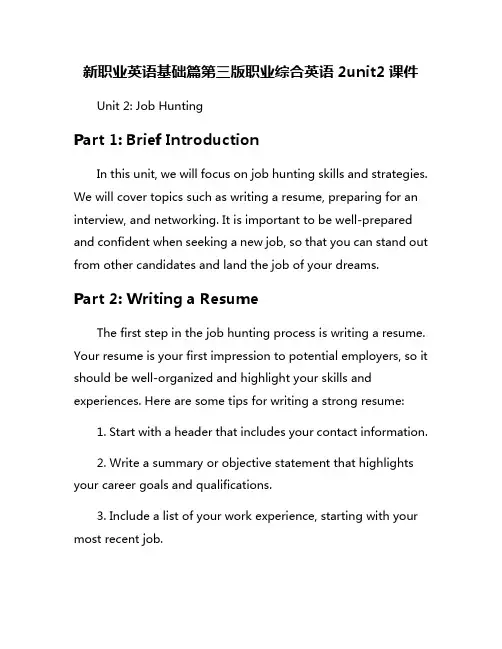
新职业英语基础篇第三版职业综合英语2unit2课件Unit 2: Job HuntingPart 1: Brief IntroductionIn this unit, we will focus on job hunting skills and strategies. We will cover topics such as writing a resume, preparing for an interview, and networking. It is important to be well-prepared and confident when seeking a new job, so that you can stand out from other candidates and land the job of your dreams.Part 2: Writing a ResumeThe first step in the job hunting process is writing a resume. Your resume is your first impression to potential employers, so it should be well-organized and highlight your skills and experiences. Here are some tips for writing a strong resume:1. Start with a header that includes your contact information.2. Write a summary or objective statement that highlights your career goals and qualifications.3. Include a list of your work experience, starting with your most recent job.4. List your education, including any degrees or certifications you have obtained.5. Include any relevant skills or qualifications that make youa strong candidate for the job.6. End with a list of references who can vouch for your skills and experiences.Part 3: Preparing for an InterviewOnce you have submitted your resume and been called for an interview, it is important to prepare thoroughly. Here are some tips for preparing for an interview:1. Research the company and the job position you are applying for.2. Practice answering common interview questions.3. Dress appropriately for the interview.4. Bring a copy of your resume and any other relevant documents.5. Prepare questions to ask the interviewer.6. Follow up with a thank-you note after the interview.Part 4: NetworkingNetworking is an important part of the job hunting process. By connecting with industry professionals and building relationships, you can increase your chances of finding job opportunities. Here are some tips for networking:1. Attend industry events and job fairs.2. Join professional organizations related to your field.3. Connect with professionals on LinkedIn.4. Reach out to former colleagues and classmates for job leads.5. Be proactive in seeking out networking opportunities.Part 5: ConclusionJob hunting can be a challenging process, but with the right skills and strategies, you can increase your chances of finding a job that is a good fit for you. By writing a strong resume, preparing for interviews, and networking effectively, you can stand out from other candidates and land the job of your dreams. Good luck!。
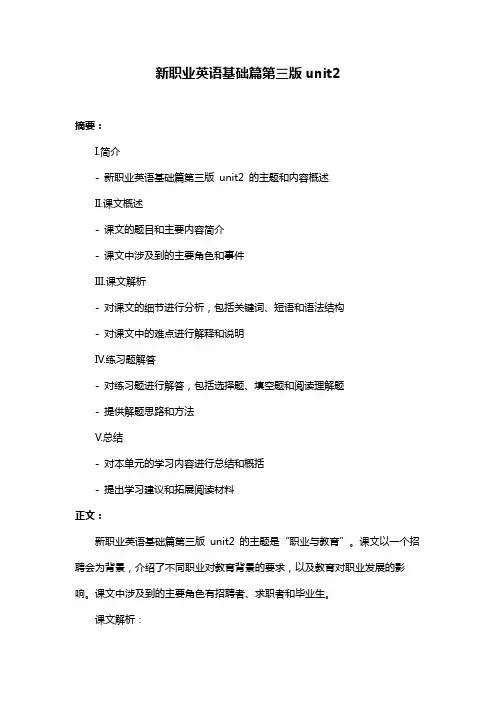
新职业英语基础篇第三版unit2摘要:I.简介- 新职业英语基础篇第三版unit2 的主题和内容概述II.课文概述- 课文的题目和主要内容简介- 课文中涉及到的主要角色和事件III.课文解析- 对课文的细节进行分析,包括关键词、短语和语法结构- 对课文中的难点进行解释和说明IV.练习题解答- 对练习题进行解答,包括选择题、填空题和阅读理解题- 提供解题思路和方法V.总结- 对本单元的学习内容进行总结和概括- 提出学习建议和拓展阅读材料正文:新职业英语基础篇第三版unit2 的主题是“职业与教育”。
课文以一个招聘会为背景,介绍了不同职业对教育背景的要求,以及教育对职业发展的影响。
课文中涉及到的主要角色有招聘者、求职者和毕业生。
课文解析:- 关键词:职业、教育、招聘、毕业生、发展- 短语:职业发展、教育背景、招聘会、求职者、工作经验- 语法结构:一般现在时、一般过去时、将来时、被动语态课文解析中,我们发现课文中使用了一些重要的语法结构,如一般现在时、一般过去时和将来时。
此外,课文还涉及到了被动语态的运用。
在理解课文时,需要注意这些语法结构的变化和运用。
练习题解答:- 选择题:根据课文内容,选择正确的答案。
例如,问:招聘者看重求职者的哪些方面?A.教育背景B.工作经验C.个人能力D.语言能力。
答案:A.教育背景。
- 填空题:根据课文内容,填入正确的单词或短语。
例如,问:招聘会上,毕业生需要展示自己的_______和_______。
答案:教育背景、个人能力。
- 阅读理解题:根据课文内容,回答问题。
例如,问:课文中提到,教育对职业发展的影响是什么?答案:教育可以为职业发展提供基础和支持。
总结:本单元的主题是“职业与教育”,通过课文和练习题,我们了解了不同职业对教育背景的要求,以及教育对职业发展的影响。
在学习过程中,我们需要注意课文中的关键词、短语和语法结构,并掌握解题思路和方法。

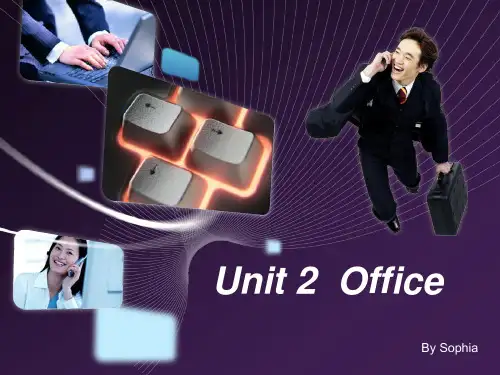
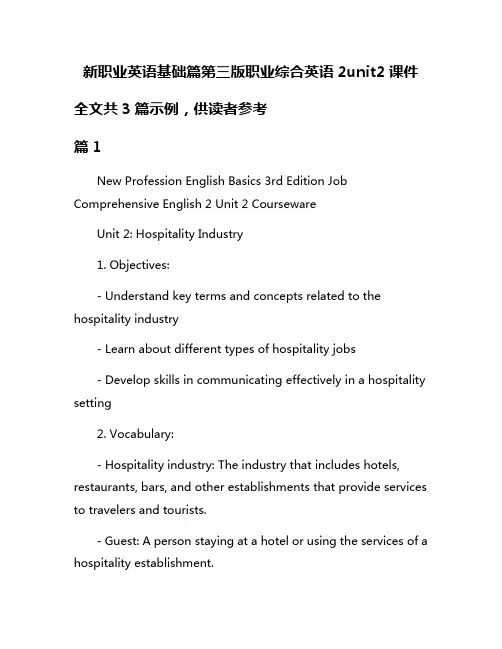
新职业英语基础篇第三版职业综合英语2unit2课件全文共3篇示例,供读者参考篇1New Profession English Basics 3rd Edition Job Comprehensive English 2 Unit 2 CoursewareUnit 2: Hospitality Industry1. Objectives:- Understand key terms and concepts related to the hospitality industry- Learn about different types of hospitality jobs- Develop skills in communicating effectively in a hospitality setting2. Vocabulary:- Hospitality industry: The industry that includes hotels, restaurants, bars, and other establishments that provide services to travelers and tourists.- Guest: A person staying at a hotel or using the services of a hospitality establishment.- Front desk: The area in a hotel where guests check in and out, make reservations, and ask for information.- Concierge: A hotel employee who assists guests with various services, such as booking tickets, making restaurant reservations, and arranging transportation.- Housekeeping: The department in a hotel responsible for cleaning and maintaining guest rooms and public areas.- Room service: The service in a hotel that delivers food and beverages to guests in their rooms.- Check-in/check-out: The process of arriving at and departing from a hotel.- Amenities: Extra features and services offered by a hotel, such as a swimming pool, gym, or spa.- Hospitality skills: The skills needed to provide excellent service to guests, such as communication, problem-solving, and teamwork.3. Jobs in the Hospitality Industry:- Hotel manager: Oversees the day-to-day operations of a hotel, including staff management, guest services, and budgeting.- Front desk agent: Greets guests, checks them in and out, and provides information and assistance during their stay.- Concierge: Assists guests with booking activities, making reservations, and arranging transportation.- Housekeeper: Cleans and maintains guest rooms and public areas in a hotel.- Bartender: Prepares and serves alcoholic and non-alcoholic beverages to guests at a bar or restaurant.- Waitstaff: Takes orders, serves food and beverages, and provides excellent customer service in a restaurant.- Chef: Prepares and cooks meals in a restaurant kitchen, creating delicious dishes for guests to enjoy.- Event planner: Organizes and coordinates events, such as weddings, conferences, and parties, for clients.4. Communication Skills in the Hospitality Industry:- Greeting guests: When a guest arrives, it's important to greet them warmly and make them feel welcome.- Listening: Listening carefully to guests' needs and requests is essential for providing excellent service.- Problem-solving: Handling guest complaints and resolving issues in a timely and effective manner is key to maintaining guest satisfaction.- Teamwork: Working together with colleagues to ensure that guests receive the best possible service and experience.5. Conclusion:The hospitality industry offers a wide range of exciting and rewarding career opportunities for those who are passionate about providing excellent service to guests. By developing your communication skills, building your knowledge of the industry, and gaining experience in various hospitality roles, you can succeed in this dynamic and fast-paced field. Good luck!篇2New Professional English is a series of textbooks that are designed to improve English language skills for specific professions. The third edition of the Basic Level of New Professional English introduces students to a wide range of vocational topics and helps them develop the English language skills necessary to communicate effectively in a professional setting.One of the units in the textbook is Unit 2, which focuses on the topic of Career Paths. This unit helps students explore different career options, discuss their career aspirations, and learn vocabulary related to professions and job interviews. The lesson includes activities such as reading texts about different professions, listening to interviews with professionals, androle-playing job interviews.The lesson begins with a warm-up activity to introduce the topic of careers and get students thinking about their own career goals. This is followed by a reading activity where students learn about various professions and career paths. The students then practice using the new vocabulary in speaking activities where they discuss their own career aspirations and share information about different professions.In the listening activity, students listen to interviews with professionals from different fields and answer questions about their career paths and experiences. This helps students develop their listening skills and learn more about the realities of working in different professions.The unit concludes with a role-playing activity where students simulate job interviews and practice their speakingskills. This allows students to put into practice the vocabulary and language structures they have learned throughout the unit.Overall, Unit 2 of the New Professional English Basic Level textbook provides students with a solid foundation in English language skills related to careers and professions. By engaging in a variety of activities, students are able to improve their reading, listening, speaking, and vocabulary skills in a practical and relevant context. This prepares them for success in their chosen profession and helps them communicate effectively in a professional setting.篇3Unit 2: Telecommunications1. IntroductionThis unit focuses on the telecommunications sector, which plays a vital role in connecting people and technology. We will learn about the history and development of telecommunications, as well as the different types of communication technologies and services available today.2. Historical OverviewTelecommunications has a long history dating back to the invention of the telegraph in the 19th century. Over time, new technologies such as the telephone, radio, television, and internet have revolutionized communication. Today, we have a wide range of digital communication tools such as smartphones, social media, and video conferencing.3. Telecommunications InfrastructureTelecommunications infrastructure refers to the physical components and networks that enable communication to take place. This includes cables, satellites, towers, and data centers. The infrastructure is constantly evolving to meet the growing demands for faster and more reliable communication services.4. Types of Telecommunications ServicesTelecommunications services can be broadly categorized into three main types: fixed-line, mobile, and internet services. Fixed-line services use landlines to connect calls, while mobile services use cellular networks to enable wireless communication. Internet services allow users to access the web, send emails, and participate in online activities.5. Emerging TechnologiesThe telecommunications sector is constantly evolving with the introduction of new technologies such as 5G, IoT (Internet of Things), and AI (Artificial Intelligence). These technologies are shaping the future of communication by offering faster speeds, greater connectivity, and improved efficiency.6. Career OpportunitiesThere are numerous career opportunities in the telecommunications sector, including network engineers, software developers, data analysts, and customer service representatives. As technology continues to advance, the demand for skilled professionals in this field is expected to grow.7. ConclusionThe telecommunications sector is a dynamic and fast-paced industry that is constantly evolving to meet the demands of modern communication. By understanding the history, infrastructure, services, and emerging technologies in telecommunications, we can prepare ourselves for a successful career in this exciting field.。

